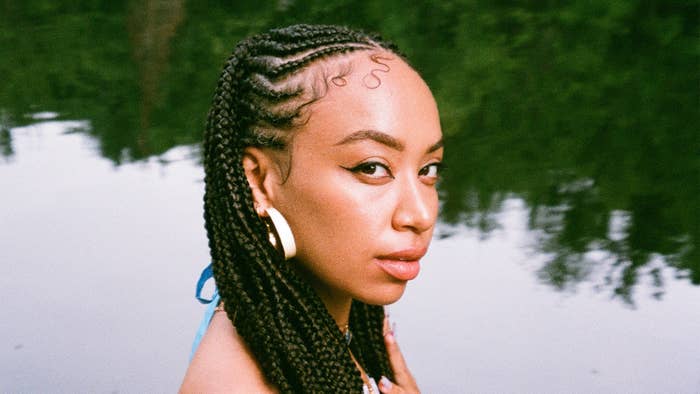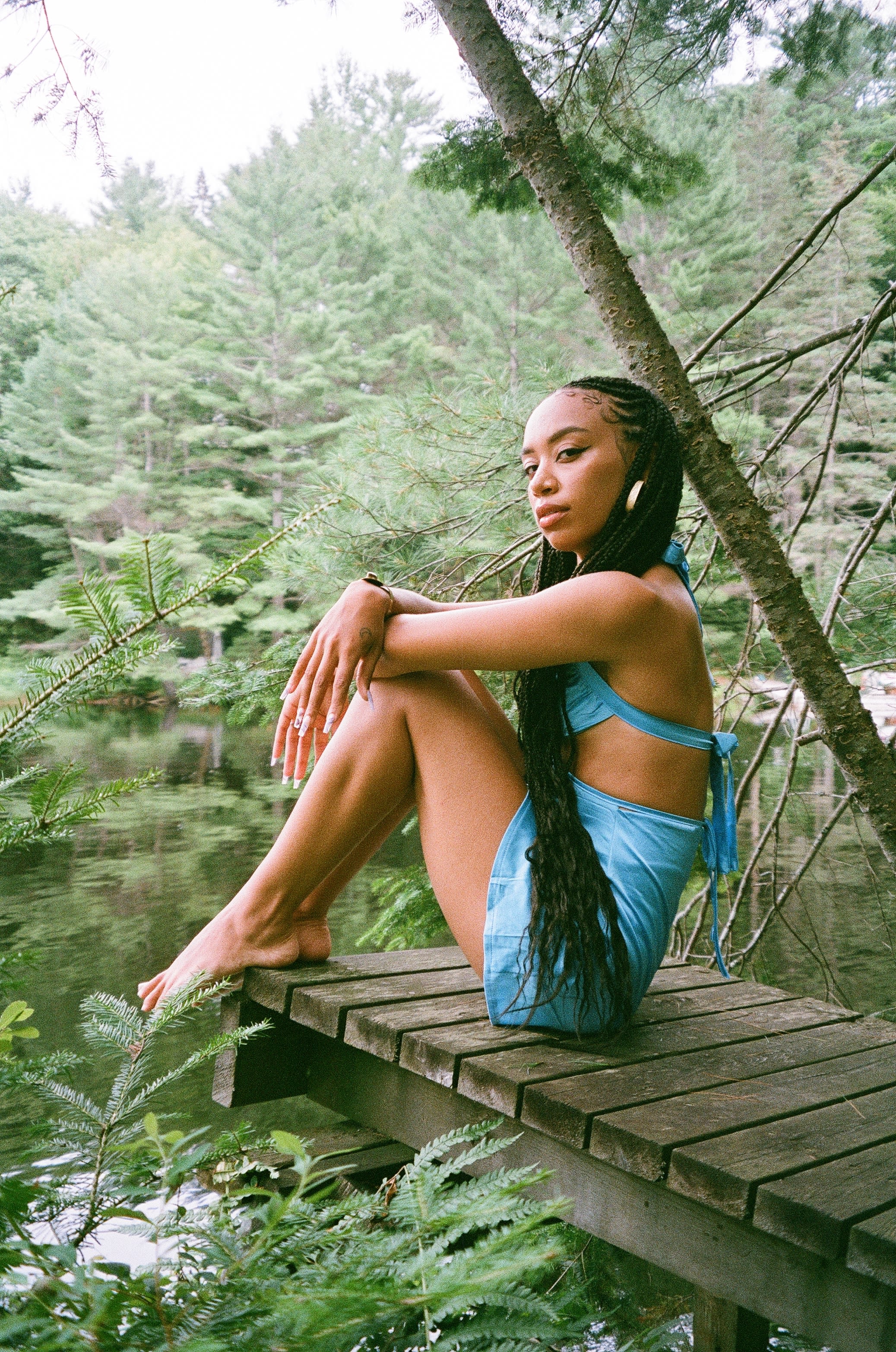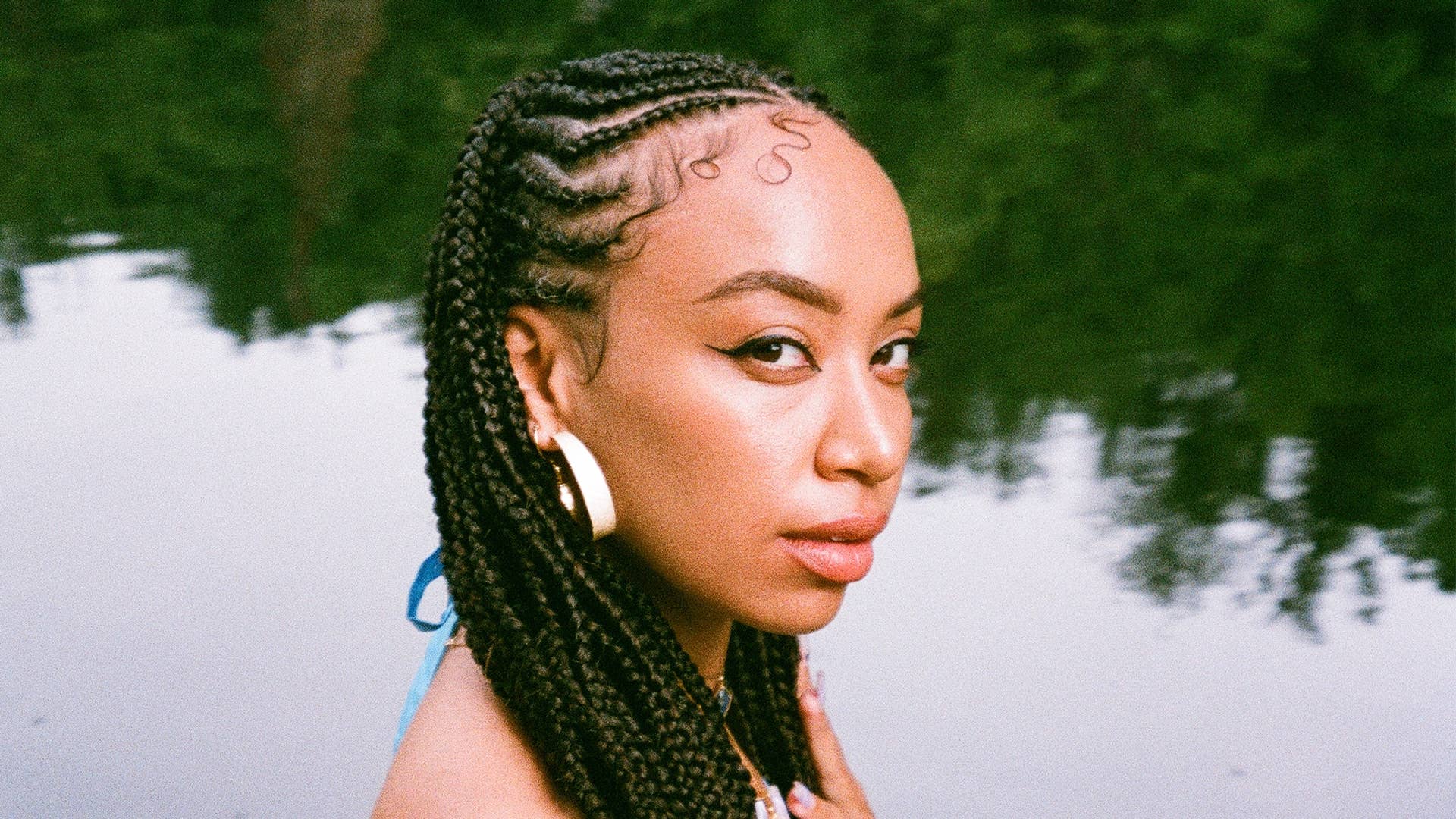
If you ask Toronto R&B singer-songwriter a l l i e how she survived the COVID-19 shutdowns, her answer is simple: music.
It’s been almost four years since the release of her first album, Nightshade, and in that time she’s travelled, connected with her ancestral roots, and cooked up another album all while trying to hold onto her sanity during the pandemic. It’s partly due to her global traipsing that her latest project, Tabula Rasa, exists, and the process—or as she says, the flow—of piecing it together became her lifeline in a time when the world was filled with turbulence.
Today, Tabula Rasa is out and the project is a culmination of personal growth and self-discovery inspired by a visit to Jamaica, Airbnb hopping across Europe, and a healthy amount of rest. After being uncertain about making another album, Tabula Rasa is about turning the page and embracing rebirth, with an exploration of experimental sounds and unapologetically honest lyricism.
We caught up with her to talk collaborations, recording on a mountain, and how she hopes listeners will feel after hearing her new songs.
So this is so funny, I don’t know if you remember I actually interviewed you in January for Global News about the Grammys.
Yeah, of course. I remember! That’s sweet. I was saying to my manager yesterday, I was like, “Yeah, I feel good about it because I’ve already chatted with her before.” So it’s cool.
And so actually, that brings me to my first question. So I remember when we chatted before, you had told me about how you’ve been working on your production skills when it came to working on this album. So is this the first time you fully executive produced a whole project?
I did executive produce my last full length as well, but I’d say I was a lot more immersed in the process in a different way. This time around, I really got to flex all the skills that I’ve learned in between these two projects, in terms of really working through the arrangements with the producers, and being in the studio while the tracks were being made, and really getting to coax out what I wanted from each track from the producers. And putting my hands on all of the arrangements in terms of… I always arrange all of my vocals and my melodies, my harmonies, and all the little vocal samples you hear throughout the tracks.
This time, it was more about adding that live instrumentation elements into a lot of the tracks being like, “Okay, I want a string section here,” or “I want to build a bridge out here” or “I want a horn section in in this part of the song,” and bringing in those musicians that I needed to execute that vision.
That’s so exciting. It’s like being in the driver’s seat of what you want it to sound like.
Yeah, it felt super empowering, for sure, to have that much control and also that much flexibility in terms of like where each song was able to go.
For sure. And so obviously, I mean, you were working on this for a while, but it’s still a pandemic. So how was it working with the other producers and engineers and the musicians during COVID? Were you able to get into the studio or did you have to do a lot of it at home?
I did do a lot of it at home. Thankfully, we were in the studio in 2019, working on the album. So I got to have a lot of sessions in studio with a lot of the producers that were working on the album before the pandemic started. So that foundation was already laid. And then when we got into the pandemic, honestly, making this album was like my lifeline through that, because [of] not being able to be physically connected to anyone. But being able to be energetically connected to all of the people that I was working with, through the music was really essential to me, and to my mental space over the course of the pandemic. And being able to work remotely and send things back and forth, I think that allowed us to still feel really connected, even though we couldn’t be in the same room throughout the process.
I was working a lot in my home studio. And also, sometimes we would just like, [with] Casey MQ for instance, who I wrote “Clean Sight” with, we would just like sit on his porch with portable speakers and just a laptop and write outside, or just sit in a park and write. And so we were just trying to find creative ways to do it. I definitely had some some sessions on Zoom. And we just made it happen.
I wanted to touch a bit on what you said earlier about music sort of being your lifeline throughout the pandemic, because I know before you’ve said, you find music to be very healing, and I know you practice meditation—you’re really into astrology as well, right?
Yeah, I do. I am into astrology. Like I’m not an expert on astrology by any means, [laughs][but] I do find it very entertaining.
“It was just a really special trip in terms of being able to connect in with my ancestry and my ancestral guidance, in a way that I had never been able to do. I felt so connected to the land, and when I came home from that trip, I felt ready to make the project.”
Yeah, no, that’s okay, I was just thinking about that now.
[Laughs.]
I had read that you had taken a trip across Europe, and you visited Jamaica not long ago—I’m wondering how those travels contributed to material for the album, and for inspiration as well.
Yeah. Um, I actually get little tingles when I think about my trip to Jamaica, because obviously, I’ve been trapped here. Yeah, it was just such a beautiful memory. But that was really the starting point of this project for me. I knew I was gonna make a full length album, but I was feeling super uninspired. And I had no idea how I was going to make a full body of work. And I had been wanting to take that trip to Jamaica for a long time. My father’s Jamaican, and I had been before, but I had never spent a decent chunk of time there. So that was the first time that I spent a few weeks down there, and I was staying in Portland, and I rented an Airbnb, literally on top of a mountain and just secluded myself for about a week up there. I had all of my recording gear with me. And I was just writing and cutting demos in this little Airbnb on the mountain top with this beautiful view of the ocean, and I wrote “River Song,” which is the second track on the album during that stay, and that was really what set off the inspiration for the rest of the project.
From there, my dad picked me up from that Airbnb in Portland and we drove all the way across the island. All the way to Montego Bay, stopping along the way. I got to see where where he grew up. And it was just a really special trip in terms of being able to connect in with my ancestry and my ancestral guidance, in a way that I had never been able to do. I felt so connected to the land, and when I came home from that trip, I felt ready to make the project.

I think there’s definitely something about the power of those cultural ties sparking something.
Yeah, absolutely. It felt like energetic downloads, and my grandmother who came from Jamaica, in in the ‘60s, she came on her own to Toronto, and then it took her about five or six years before she was able to send for her kids, which is a very common story from Jamaica to Toronto. But I mean, she passed away many years ago, but during that trip, I just felt so connected to her and to her journey and to her story. And it was just really energizing and invigorating in the sense that I just I felt her presence, and it gave me the energy that I needed to to make the project.
It definitely sounds like it was meant to be, everything sort of fell into place to kind of set you up to do this. I guess, touching on that a bit more, obviously, you took your time with this, as you said, you weren’t sure if you were going to be able to put out a whole body of work because it was kind of an intimidating thing. And your debut, I believe it came out in 2017. Do you think taking the time to really sort of experiment with these different sounds and see these different places help to push you and grow as an artist?
Definitely. And I’m always pushing myself in that way, in terms of wanting to get out of the city and experience other things so that I can tie that into the music that I’m creating. And when I came back from that trip from Jamaica, shortly after that I went to Europe for about six weeks and did the same thing that I did in Jamaica—I just had all my gear and a little suitcase. And I was just staying at Airbnbs setting up my remote studio. I wrote “Coop” in an Airbnb in Budapest. And then I also was in Berlin, London, in Spain, I wrote “Dopamine” in an Airbnb in Spain. So there’s a lot of energies from different places across the globe on this project in terms of what I was drawing from, and that’s really important to me to seek that out for myself, especially when I’m not feeling inspired. I’m like, “Okay, I guess I got to go somewhere.” And that’s always been my mode of operation.
“I worked really hard on this album. But I also moved away from that hard work mentality in terms of like, I have to grind myself into the ground and the cost is me.”
It sounds very much like this is an international album. What would 2017 a l l i e think of the music that you’re making right now in 2021, having been to all these places?
I think 2017 a l l i e would love this album and be super proud of the progress that I’ve made as an artist and as a producer and as a writer. But also, I think mostly the biggest change has been how I feel throughout the process. Because this process for this album, there was so much ease involved. I’m not saying that it was easy to make. But the process had a lot of flow to it. And I really allowed myself to just tap in to my intuition and let that guide me and not fight against it. Which was a really beautiful experience to have this time around.
That’s good, I feel like, me as a writer, it’s one of those things where if we’re feeling uninspired, or you have writer’s block or something, you’re always told to just push through it, power through it. But I feel like not having to force it can be such an incredible thing. So to hear that is very reassuring.
I’ve been really trying to unravel those capitalism programs that are embedded so deeply within us. And the pandemic really helped me with that. I worked really hard on this album. But I also moved away from that hard work mentality in terms of like, I have to grind myself into the ground and the cost is me. And that’s what I mean, in terms of making this album, there was a lot of ease around it in terms of when I needed to rest, I would just rest, and when I needed recuperation, I would just take it for myself. And I think that made the project so much better in the end.
“I built an ancestral altar. That was the biggest shift for me personally, a space where I could really just sit every day and have that ritual practice.”
I was also going to say, a lot of time has passed since the last one. Not just with regards to rest and relaxation, but I mean, everything going on in the world regarding COVID, and Black Lives Matter, and all these other crises that are happening, I guess, trying to navigate that while also making music—how did you find that? Or was that just sort of another thing reminding you, “Okay, it’s okay to step back and take a break and rest?”
Yeah, I think that was just across the board on a collective level of something that we all really needed. And I’ve just heard that echoed from so many different people. But on a personal level, for me, it manifested as me really deepening into my spiritual practice out of necessity, because it was so intense, and the collective anxiety was so loud. So I really felt like it was so necessary to really deepen into my spiritual practices in a way that I hadn’t always wanted to, but I felt that I didn’t have the time for. And I had no excuse, I had so much time on my hands. And it really allowed me to prioritize my spiritual hygiene, my daily rituals around my spirituality. And that ultimately also added so much to this album.
Was there anything new or that specifically you did to strengthen that energy or that spiritual connection that you were feeling during this time?
Yeah, I built an ancestral altar. That was the biggest shift for me personally, a space where I could really just sit every day and have that ritual practice. And just connect. I experienced some really powerful shifts from just developing that discipline with myself of having that space for reverence at the altar every day. And that was something that became super important throughout the process.
I imagine. Then, throughout the whole project, there’s a number of artists who you collaborated with, like, I’m thinking River Tiber, The Kount, so many people, and a number of them you’ve worked with before. What was it like working with them again? How’s your relationship with them—has it evolved or changed in any way this time around?
Yeah, for sure. It was amazing to work with them again. I mean, everyone who worked on this album is brilliant at what they do. And the producers that I worked with, on both albums, they’re all really good friends of mine. There’s just such a mutual respect and such real friendships there. So it’s super easy to work with them. Like working with with The Kount, I’ve been working with him for years and years. And he had a little come-up from the pandemic until now, which has been incredible to watch and blossom in that way. And I mean, I really think that those guys always bring out the best in me. I’m just so happy that we’re still working together after all these years.
What do you hope listeners are goning to take away after listening to the album?
I mean, I always want my music to offer healing and solace to people. I hope that they feel connected to some of the themes within the music and just connected in terms of… we’re all in this human experience together. And as much as we feel far apart sometimes, we really are all doing this thing called life.
“I think as an artist, the idea of the blank page is so intimidating, but it’s also the most invigorating thing in the world, because there’s so much potential there for it to be whatever you want it to be.”
Honestly, it all kind of comes full circle, because you’ve got all of these inspirations and sounds from different places. It’s a worldwide thing. It all coming down into this one project is just definitely a way to, I think, bring people together. So it makes sense. You’ve named several already, but was there any sort of specific moment when you were working on this project, maybe it was during the songwriting, or when you were doing vocals, whatever it may have been, that really stood out for you that you were like, “Yeah, like, this is the album I want to be making right now.”
I had a lot of those moments. I’d say a really special moment was when Leland from BADBADNOTGOOD sent me his solo for “Violet Nights.” I sent him the track, and I didn’t know what he was gonna say, if he was gonna like it, or if he was gonna be down to do it. And this was in the middle of the pandemic—we weren’t able to get in the studio for that. So, when he sent that solo back to me, it was just one of those moments where I was like, “Wow, he really understood the assignment.” [He] came all the way through and elevated the track to this whole next level, and I think it’s so beautiful to have an instrumental feature on a project.
I think, with instrumentals… words can get in the way sometimes. So I think that that part of the track really transports you to this whole other realm that I’m speaking about in the verse. I’m speaking about the astral realm and I’m speaking about being a multidimensional being, and then Leland just comes through with this completely otherworldly solo, and so I just felt like that was just such a beautiful moment of connection where he just completely understood what needed to happen without even being in the room with me.
It sounds like it. Is there anything else you you wanted to add?
I guess the only other thing I would speak about would be the title of the album.
Yeah, let’s do it!
Tabula Rasa translates to blank slate or clean slate. For me, that was what I was craving the most going into the process of making this album. I was very unsure whether I wanted to continue with music after I made my first album, and I was really looking for a way to do it that would be sustainable for me as an artist in terms of my mental health, and my physical health, and all of that. This project really gave me that clean slate that I needed, and I think as an artist, the idea of the blank page is so intimidating, but it’s also the most invigorating thing in the world, because there’s so much potential there for it to be whatever you want it to be. And so that’s where the title came from, and this was my moment to have that clean slate and put whatever I wanted onto it.




